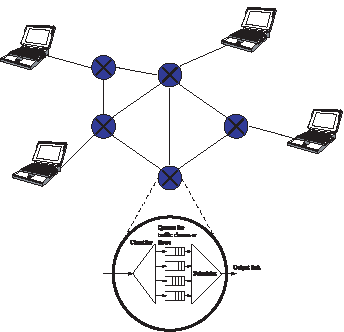|
|

|
Research Project: Resource allocation and sharing in network communicationProject description | Publications |
Project description
This project is inspired from the fact that the issues and challenges for the development of wireless, mobile and global communication systems encompass a broad spectrum of research topics and involves a way to envision the evolution of the next generation networks and network resources. The project is on how to dynamically allocate resources (codes, channels, time, computing servers, etc) in a way that accounts for quality-of-service (QoS) parameters (deadlines, jitter, error probability, bandwidth availability, etc). See also the group's related project on multipeer information dissemination and consistency support. On the channel allocation problem in cellular networks: to avoid signal interference in mobile communication it is necessary that the channels used by base stations for broadcast communication within their cells are chosen so that the same channel is never concurrently used by two neighboring stations. A solution to the channel allocation problem should aim at minimizing the connection setup time and overhead as well as hand-offs. A good solution should also aim at maximizing the number of satisfiable requests; clearly this implies that it should adapt fast to temporal variations in channel demand in different cells. A very important property of a solution is its ability to cope with failures, since they are a fact of life in any distributed setting. To make efficient use of the bandwidth available we also need to ensure that the number of free frequencies needed at a base station so that its requests can be satisfied is small. The results produced within this project not only improve previous solutions to the channel allocation problem with respect to efficiency and fault-tolerance but also give new tools to study the problem, by showing shown how to analytically measure and provide worst-case guarantees regarding request satisfiability. Besides, having the problem solved in distributed manner improves the quality of communication services, since it implies better adaptation to channel demand variation and failure locality, as opposed to the centralized solutions currently in use. Further results of the project include dynamic tuning strategies to balance the tradeoff between connection set-up time and request satisfiability, accompanied by an evaluation, which also provides a way to measure the down-side of the trade-off and to get new insights into the issues involved in attempting to optimize key constraints (work nominated for best-paper award). Publications
|
|
|
|
|
|
© Distributed Computing and Systems Research Group Chalmers university of technology, Computing Science Department Rännvägen 6B, S-412 96, Gothenburg, Sweden (map) Phone: +46 (0)31-772 1000 (central), +46 (0)31-16 56 55 Last Updated 2003-12-11 by Webmaster |
 Top of Page
Top of Page